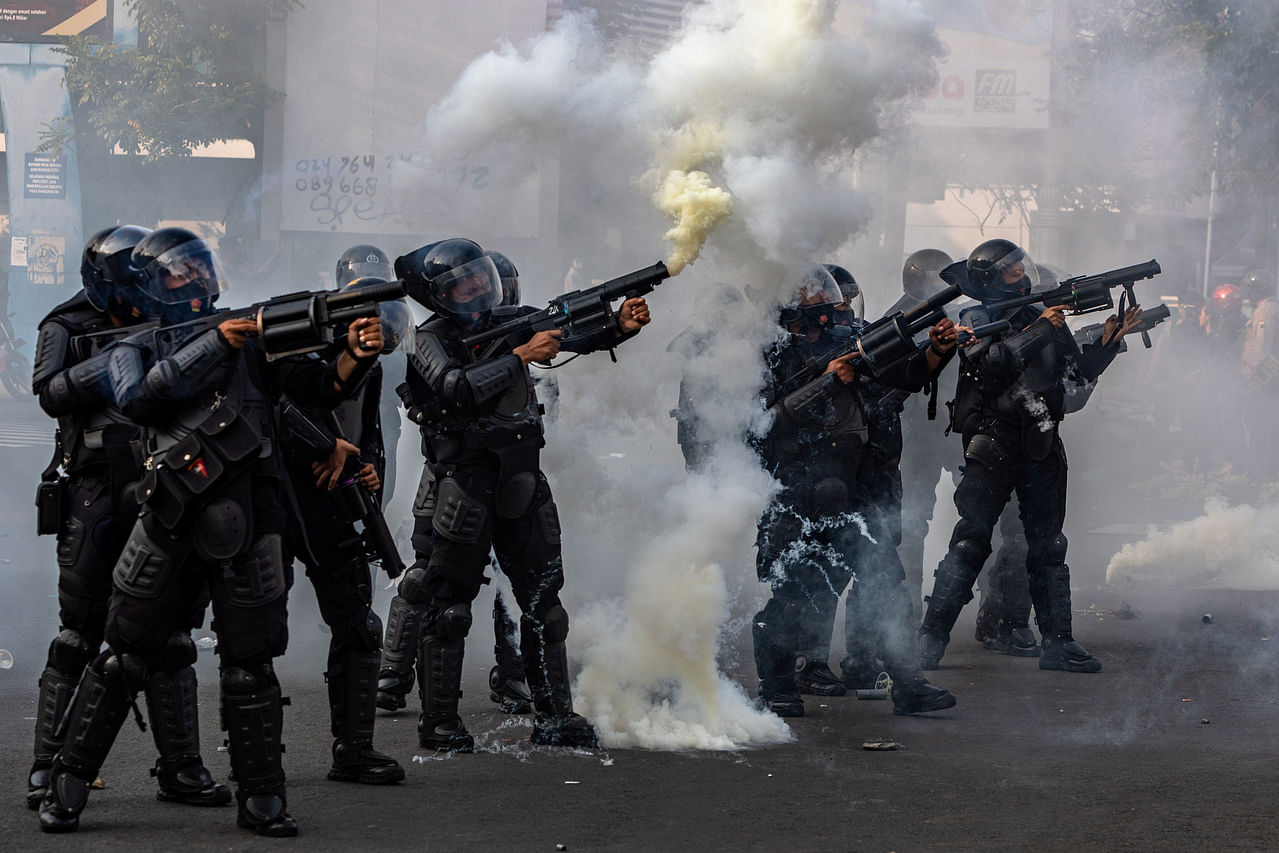JAKARTA - Police arrested hundreds of protesters and used water cannons and tear gas to disperse crowds, as thousands continued to demonstrate across Indonesia for the second day running on Wednesday (Oct 7) against a new labour law.
According to Reuters, nearly 400 people were detained on Wednesday, after protesters rallied outside parliament in Palembang in South Sumatra, and in the capital Jakarta.
The new law, passed in Parliament on Monday, was touted as necessary to attract foreign investments and create jobs to redress a pandemic-battered economy.
Indonesia - South-east Asia's largest economy - has been trying to even the keel with neighbouring countries in terms of how flexible their labour law is when it comes to hiring and firing.
The new law allows companies to keep workers on contract infinitely, but provides for the first time government-sponsored job security insurance.
Critics say this disincentivises formal hiring and weakens workers rights. The law has also been slammed for reducing environmental protections.
Officers in riot gear have been battling protesters since Tuesday, predominantly in the most populous island of Java, where many industry centres are located.
In Jakarta police spokesman Colonel Yusri Yunus said more than 200 protesters were detained on Wednesday for planning to commit anarchic acts.
Local media reported students burning tyres and pelting police with stones.
Meanwhile clashes in Bandung intensified, as police used water cannon and tear gas to push back protesters who tried to break into the local parliament compound.
Footage from the Javanese city of Semarang showed angry protesters tearing down the fence of the local parliament complex, according to Reuters.

In downtown Samarinda, the capital of East Kalimantan province, several hundreds of labourers took to the streets on Wednesday morning, carrying flags and banners that read "bring down the job creation law".
Industry minister Agus Gumiwang Kartasasmita told employers to have "intense dialogues" with union leaders to remind them of the risk of Covid-19 spread among large crowds of protesters, which could in turn lead to new clusters.
He also stressed that the industrial sector should run uninterrupted at optimal performance, especially as the country clambers to make an economic recovery following the hit from Covid-19.
"Employers and employees must promote synergy and hard work is increasingly needed to maintain investors' and buyers' confidence," Mr Agus said in a circular sent to companies.
Coordinating maritime affairs and investment minister Luhut Pandjaitan said on TVOne on Tuesday night that the new labour law would benefit Indonesian labour force as a whole, as it would attract new foreign investments and provide jobs to the unemployed.
-
Key points of omnibus law
-
• Mandatory severance pay from the employer will be cut, from a maximum of 32 times a laid-off worker's monthly salary to 19 times. The government will pay an additional six months' worth of wages.
• The two-year cap on contract employment - in place to encourage permanent hires - will be lifted. Companies can now hire employees on a contract basis indefinitely.
• Businesses no longer need written permits from a minister or designated official to hire foreigners, and can get approval from the central government. There is no more restriction on the types of jobs that can be filled by foreigners.
• The provincial minimum wage remains; the regional minimum wage can be set by governors, taking into account factors like regional economic growth. But both provincial and regional wage levels will be adjusted based on inflation or economic growth, not both.
• More economic decision-making lies with the central government, with the president and ministers empowered to overrule regulations set by regional governments.
-
Linda Yulisman
The government said misinformation about details of the new law had fueled anger and needs to be clarified.
The economic slump due to Covid-19 pandemic has, according to early estimates, wiped out more than 3.7 million jobs in Indonesia, bringing the estimated total of the unemployed to 10.6 million, or nearly 8 per cent of the 133 million workers in the country.
"No government would want to disadvantage its own people. I appeal to all labour unions... Please use your heart. During this pandemic, (street protests) could cost lives... and jeopardise the operations of the companies that pay labourers' wage," Mr Luhut urged.








